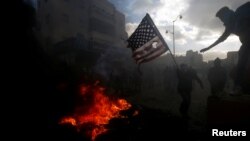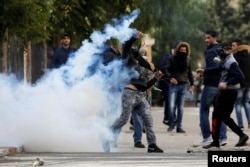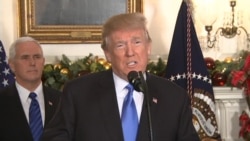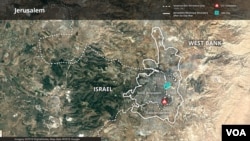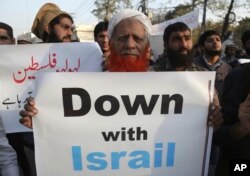Clashes between Palestinian protesters and Israeli troops and street protests erupted Thursday in the West Bank and Gaza on the day after U.S. President Donald Trump recognized Jerusalem as the Israeli capital.
In the West Bank, crowds of demonstrators threw stones at the Israeli forces and set tires afire in Ramallah, the seat of the Palestinian government, where a thick plume of black smoke hovered over the city. Dozens sustained minor injuries in the skirmishes.
In the biblical town of Bethlehem, the birthplace of Jesus, troops fired water cannons and tear gas at protesters, while in Gaza, demonstrators burned posters of Trump and Israeli Prime Minister Benjamin Netanyahu and set U.S. and Israeli flags on fire.
Palestinians closed shops and schools in a general strike, while Ismail Haniyeh, the leader of the Hamas militant group that runs Gaza, called for a third Palestinian armed uprising against the Israelis. Hassan Nasrallah, leader of the Lebanese militant group Hezbollah, said all Mideast peace negotiations should be halted until Trump reverses his Jerusalem decision.
Heightened security
Fearing an escalation, Israel has been beefing up security forces in the West Bank, East Jerusalem and along the Gaza border.
Trump’s recognition of Jerusalem as Israel’s capital also sparked anger across the Arab and Muslim world and consternation from U.S. allies.
WATCH: Trump on Jerusalem decision
Jerusalem is home to the Mosque of Al-Aqsa, the third holiest place in Islam, and Palestinians see East Jerusalem as the capital of a future state. Many countries throughout the world have long thought that the city's ultimate status would only be decided through Israeli-Palestinian peace negotiations, but Palestinian officials said Trump's decision has disqualified the U.S. as an honest broker in the peace process.
For Israel, however, the Al-Aqsa compound is known as the Temple Mount, the site of the two biblical Temples and the holiest place in Judaism. Netanyahu said, "The president’s decision is an important step towards peace, for there is no peace that doesn’t include Jerusalem as the capital of the state of Israel.”
Islamist rallies
Hundreds of Islamists rallied in major Pakistani cities, condemning Trump's decision. The al-Qaida-linked extremist group al-Shabab urged "all Muslims to raise arms and defend the blessed Al-Aqsa from the Zionist occupiers supported by America, because what was taken by force can only be restored by force."
Iraqi Prime Minister Haider al-Abadi, a U.S. ally, said Trump should "retreat from that decision in order to stop a dangerous escalation that leads to extremism and creates an atmosphere which helps terrorism."
European Union foreign policy chief Federica Mogherini said Trump's decision "has the potential to send us backwards to even darker times than the one we are already living in."
French President Emmanuel Macron and German Chancellor Angela Merkel both said the status of Jerusalem should be part of Israeli-Palestinian talks and rebuffed Trump.
"I don't share in this decision, and I disapprove," Macron said.
Nobel laureate Desmond Tutu said, "God is weeping over President Donald Trump's inflammatory and discriminatory recognition of Jerusalem as the capital of Israel."
But U.S. Secretary of State Rex Tillerson defended the decision on a visit to Vienna.
"As the president said in his remarks, recognition of Jerusalem is a recognition of reality," Tillerson said. "All of Israel's government offices are largely in Jerusalem already so the U.S. is just recognizing the reality of that. I think it's important though in the context of those remarks the president also said the U.S. would support a two-state solution if that is the desire of the two parties and he also said this does not in any way finalize the status of Jerusalem."
"That's still left to the parties to discuss," the top U.S. diplomat added. "I think the president was very clear in that regard. We're very committed to a peace process still. It's what I know the whole world wants, and we still believe there is an opportunity for peace."
Robert Berger in Jerusalem contributed to this report.




